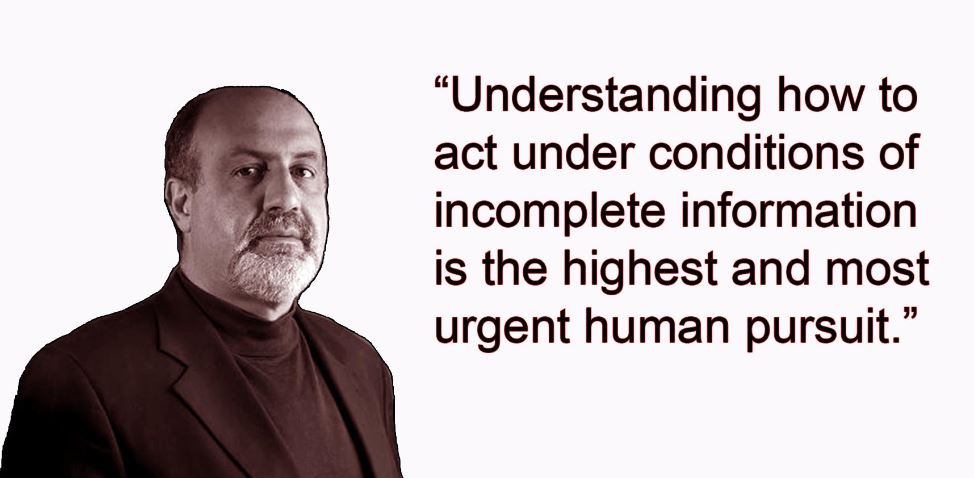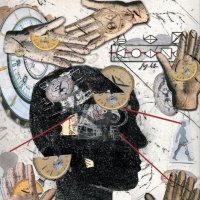Nassim Taleb
Focus On The Consequences And Not On The Probability
An investigation of opacity, luck, uncertainty, probability, human error, risk, and decision making when we don’t understand the world.

Nassim Taleb - Overview
Nassim Taleb is the author of the INCERTO a philosophical and practical essay on uncertainty that comprises 5 books:
Our world is full of chance and the unknown and the broader canvas of Taleb's work is all about alerting us to the level of uncertainty and unpredictability of life whilst offering us practical ideas and strategies to enable us to survive and even prosper in these conditions.
He teaches us how to avoid crossing the street blindfolded as he urges us to follow the main rule of living with uncertainty:
- To learn to perceive it as it really is - and not to delude ourselves into seeing it in the manner that makes us feel most comfortable.
- To make decisions that focus on the consequences - which you can know - and not on the probability of an event - which you cannot know.
Nassim Taleb - Praise and Criticism
The intellectual establishment, which includes the influential news media, rewarded him by declaring him one of the most important thinkers in the world.
"The new sage. The trader turned author has emerged as the guru of the global Financial meltdown. Not only is he riding high in the bestseller lists, his theory of black swan events has become the most seductive guide to our uncertain times."
The Observer
"A giant of Mediterranean thought. Now the hottest thinker in the world"
London Times
"Taleb not only had an explanation for [the crisis], he saw it coming"
The New York Times
"Now hailed as a seer"
The Economist
Taleb is rude and arrogant in his criticisms of those who disagree with him and he indulges in loud and abrasive slanging matches with his opponents on twitter.
He has been described as an intellectual asset gone rogue:
"...over the years it has become evident that he wishes to take down the entire intellectual world, or at least that part which he does not agree with or which has slighted him in some way.
He
has said repeatedly that professionals like economists, historians and
psychologists are frauds. And columnists too. Taleb finds the word
“scientist" in “social scientist" hilarious.
Only Sam Harris, a neuroscientist and a popular author and podcaster,
whom Taleb once called an “imposter", has demonstrated the ability to
match Taleb’s venom:
“This guy is just insufferable. I’ve actually never witnessed a marriage of incompetence and confidence so fully and grotesquely consummated in the mind of a person with a public platform."
When commenting on this in a public address to Google employees Nasim Taleb said that that this is his way of putting his skin in the game and that if those he insults don't like it they can sue him.
Nassim Taleb - Themes of His 4 Main Books
Fooled By Randomness
Nassim Taleb:
- “Our minds are not quite designed to understand how the world works, but, rather, to get out of trouble rapidly and have progeny. If they were made for us to understand things, then we would have a machine in it that would run the past history as in a VCR, with a correct chronology, and it would slow us down so much that we would have trouble operating.”
- “A mistake is not something to be determined after the fact, but in the light of the information until that point."
- "Nobody accepts randomness in their successes, only their failures.”
- “The public person most visibly endowed with such a trait is George Soros. One of his strengths is that he revises his opinion rather rapidly, without the slightest embarrassment…"
- "What characterizes real speculators like Soros from the rest is that their activities are devoid of path dependence. They are totally free from their past actions. Every day is a clean slate.”
- “My lesson from Soros is to start every meeting at my boutique by convincing everyone that we are a bunch of idiots who know nothing and are mistake-prone, but happen to be endowed with the rare privilege of knowing it.”
The Black Swan
Nassim Taleb:
- “The strategy for the discoverers and entrepreneurs is to rely less on top-down planning and focus on maximum tinkering and recognizing opportunities when they present themselves. So I disagree with the followers of Marx and those of Adam Smith: the reason free markets work is because they allow people to be lucky, thanks to aggressive trial and error, not by giving rewards or “incentives” for skill. The strategy is, then, to tinker as much as possible and try to collect as many positive Black Swan opportunities as you can.”
- “In general, positive Black Swans take time to show their effect while negative ones happen very quickly— it is much easier and much faster to destroy than to build.”
- "As you give someone more info, the more they will refine and create predictions, and the more wrong they will end up being. They will interpret random noise as valuable data."
- “Sir Francis Bacon commented that the most important advances are the least predictable ones, those “lying out of the path of the imagination.”
- “Consider a turkey that is fed every day. Every single feeding will firm up the bird’s belief that it is the general rule of life to be fed every day by friendly members of the human race “looking out for its best interests,” as a politician would say. On the afternoon of the Wednesday before Thanksgiving, something unexpected will happen to the turkey. It will incur a revision of belief.”
Antifragile
Nassim Taleb:
- “Some things benefit from shocks; they thrive and grow when exposed to volatility, randomness, disorder, and stressors and love adventure, risk, and uncertainty. Yet, in spite of the ubiquity of the phenomenon, there is no word for the exact opposite of fragile. Let us call it antifragile. Antifragility is beyond resilience or robustness. The resilient resists shocks and stays the same; the antifragile gets better.”
- “Ancestral life had no homework, no boss, no civil servants, no academic grades, no conversation with the dean, no consultant with an MBA, no table of procedure, no application form, no trip to New Jersey, no grammatical stickler, no conversation with someone boring you: all life was random stimuli and nothing, good or bad, ever felt like work. Dangerous, yes, but boring, never.”
- “This is the central illusion in life: that randomness is risky, that it is a bad thing— and that eliminating randomness is done by eliminating randomness.”
Nassim Taleb:
- Rent-seeking is trying to use protective regulations or “rights” to derive income without adding anything to economic activity, not increasing the wealth of others.
- By definition, what works cannot be irrational; about every single person I know who has chronically failed in business shares that mental block, the failure to realize that if something stupid works (and makes money), it cannot be stupid.
- Replacing the “natural,” that is age-old, processes that have survived trillions of high-dimensional stressors with something in a “peer-reviewed” journal that may not survive replication or statistical scrutiny is neither science nor good practice.
- Products or companies that bear the owner’s name convey very valuable messages. They are shouting that they have something to lose.
- It may not be ethically required, but the most effective, shame-free policy is maximal transparency, even transparency of intentions.
- Studying individual ants will almost never give us a clear indication of how the ant colony operates. For that, one needs to understand an ant colony as an ant colony, no less, no more, not a collection of ants.
- It suffices for an intransigent minority—a certain type of intransigent minority—with significant skin in the game (or, better, soul in the game) to reach a minutely small level, say 3 or 4 percent of the total population, for the entire population to have to submit to their preferences.
- You can define a free person precisely as someone whose fate is not centrally or directly dependent on peer assessment.
- If your private life conflicts with your intellectual opinion, it cancels your intellectual ideas, not your private life.
The
primary purpose of this site is to show you how to cope in tough times, and to
provide you with the tools to do this successfully. The
way we do this is by adopting a balanced approach and providing the
"toolkit" of information and resources to enable you to do this. I
call this approach the "The Balanced Toolkit". In
my view, Nassim Taleb’s books have, for the non-statistically trained lay person
such as myself, introduced a whole new dimension to understanding life and
added more tools to be included in our toolkit. My
single biggest takeaway is that I need to learn more about statistics and basic
mathematics! The
following is a cross-section of key points that have had impact on me. The
selection of these points is entirely subjective and I do recommend that you
read and familiarise yourself with the work of Nassim Taleb and make your own
list. Key
Points To Take Away
General
Observations Further Reading:
Nassim Taleb - Conclusions
Return from "Nassim Taleb" to: Inspirational People
LATEST ARTICLES
Dealing With Distraction - Learning How To Live With Your "Attention Autopilot"
 Living With Your Attention Autopilot The good news about your Attention Autopilot is that it will keep you safe. It is continuously scanning your immediate environment for threats. The bad news is tha…
Living With Your Attention Autopilot The good news about your Attention Autopilot is that it will keep you safe. It is continuously scanning your immediate environment for threats. The bad news is tha…The Time Of Your Life - Recognising Moments Of Alignment For Action
 How will you recognise your moment of alignment for action? In this article I want to look at our relationship with time and in the context of the two main themes of this site, firstly as a thinking s…
How will you recognise your moment of alignment for action? In this article I want to look at our relationship with time and in the context of the two main themes of this site, firstly as a thinking s…The Metagame Approach to Second Order Thinking - 5 Guiding Principles
 How To Position Yourself For Survival & Success In A Complex Environment We treat life as though it is a complicated system, and our thinking skills and mental models are focused on understanding its…
How To Position Yourself For Survival & Success In A Complex Environment We treat life as though it is a complicated system, and our thinking skills and mental models are focused on understanding its…Outcome Over Optics - Long Game Outcomes Over Short-Term Ego Gains
 The Day I Learned To Focus On Outcome Over Optics I have never forgotten the day I learned to focus on outcomes over optics and figured out a very simple way of saving myself several hundred thousand…
The Day I Learned To Focus On Outcome Over Optics I have never forgotten the day I learned to focus on outcomes over optics and figured out a very simple way of saving myself several hundred thousand…The ETTO Principle - Why Near Enough Can Be Good Enough
 How To Balance the Efficiency-Thoroughness Trade Off The ETTO Principle describes the inherent trade-off between working efficiently and working thoroughly. This trade-off is something that affects…
How To Balance the Efficiency-Thoroughness Trade Off The ETTO Principle describes the inherent trade-off between working efficiently and working thoroughly. This trade-off is something that affects…Master The Art Of Drawing The Bow
 Focus On Process Not Outcome In so many areas of our lives, we focus on the outcome, not the process that we follow to achieve it. In the western world, we are conditioned to pay less attention to how…
Focus On Process Not Outcome In so many areas of our lives, we focus on the outcome, not the process that we follow to achieve it. In the western world, we are conditioned to pay less attention to how…And So This Is Christmas
 There Is No Path To Peace - The Path Is Peace Thich Nhat Hanh, the renowned Vietnamese Zen Buddhist monk, teacher, and peace activist, often spoke about peace as a state of being that begins within on…
There Is No Path To Peace - The Path Is Peace Thich Nhat Hanh, the renowned Vietnamese Zen Buddhist monk, teacher, and peace activist, often spoke about peace as a state of being that begins within on…Curiosity Skilled The Cat - Optimize For Interesting
 Curiosity Fuels Excellence The old adage, “Curiosity killed the cat,” warns of the dangers of venturing too far into the unknown. But what if we reimagine it not as a risk but as a gateway to developi…
Curiosity Fuels Excellence The old adage, “Curiosity killed the cat,” warns of the dangers of venturing too far into the unknown. But what if we reimagine it not as a risk but as a gateway to developi…Let Stillness Speak - Living Within A Complex System
 To let stlllness speak is to learn it's first major lesson: you are not your thoughts. To let stillness speak is about stepping back from the constant chatter of your mind and allowing a deeper, quiet…
To let stlllness speak is to learn it's first major lesson: you are not your thoughts. To let stillness speak is about stepping back from the constant chatter of your mind and allowing a deeper, quiet…Understanding Complex Systems Thinking - It's Not Complicated
 Understanding, and being able to work with, complexity is an important thinking skill.
We are all working with complex systems, and we do so every day. The biggest one is life itself. We automaticall…
Understanding, and being able to work with, complexity is an important thinking skill.
We are all working with complex systems, and we do so every day. The biggest one is life itself. We automaticall…Stay On The Bus - When To Keep On Going
 The Helsinki Bus Station Theory
Have you ever started a new project, initiative or role with a big vision and a determination to make a difference? Initially you were full of enthusiasm and highly mo…
The Helsinki Bus Station Theory
Have you ever started a new project, initiative or role with a big vision and a determination to make a difference? Initially you were full of enthusiasm and highly mo…Zen Thoughts Email Series
 Conversations With A Friend Zen Thoughts is an email series of 50 short messages spread over 3 months. The messages are written in the style of a conversation with a friend who is going through a toug…
Conversations With A Friend Zen Thoughts is an email series of 50 short messages spread over 3 months. The messages are written in the style of a conversation with a friend who is going through a toug…How to Get What You Value by Changing What You Measure
 Give Up Control & Gain Influence To Get What You Want
The metrics we choose to focus on can significantly shape our outcomes, sometimes in ways we don't intend. The challenge is to make sure that you…
Give Up Control & Gain Influence To Get What You Want
The metrics we choose to focus on can significantly shape our outcomes, sometimes in ways we don't intend. The challenge is to make sure that you…How to Become A Master At Overcoming Hard Moments
 "The best in the world are not the best because they win every point. It's because they lose again and again and have learned how to deal with it." This quote from Roger Federer has got a lot of cover…
"The best in the world are not the best because they win every point. It's because they lose again and again and have learned how to deal with it." This quote from Roger Federer has got a lot of cover…Drop The Story - Deal With Your Demons and Transform Your Experience
 Are you living your life from the stories you tell yourself? Learning how to drop the story and deal with that voice in your head can be a game changer. When you can do this you will have a powerful t…
Are you living your life from the stories you tell yourself? Learning how to drop the story and deal with that voice in your head can be a game changer. When you can do this you will have a powerful t…


